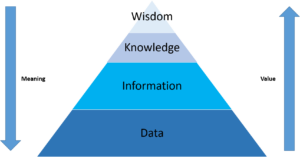Tutorial 3 – Digital professionalism
This week’s tutorial was a reminder and an opportunity to discuss our assignments. My thoughts have progressed through…
– there is an increasing reliance on smartphones for instant information gratification
– how do we ensure that what we’re seeing ‘on the hoof’ is relevant to the situation we are in?
– the use of software such as UpToDate and DynaMed, that require subscriptions which NHS institutions may not want to invest in, or prefer local solutions based on trust guidelines
– who should be responsible for keeping resources like these relevant and accessible?
These are obviously all big topics, and on reflection I think the issue I’m interested in is data curation. I’ve found it helpful to look at the hierarchy of information needs – the ‘DIKW pyramid’ – to get to grips with the concept of wisdom:

When I’m on the wards seeing patients and I need to look up something quickly, I don’t want raw data. What I’m looking for is information: data which has been organised into a structure to give context. I can then process and validate this in combination with my previous experiences and understanding to develop new knowledge, to inform how I act next in the given scenario.
With that in mind, I think my assignment question will be something like:
“As medical professionals, how can we use technology to find the relevant information to develop our knowledge in a given clinical situation?




Hi Ellie – although I am generally skeptical about pyramids, I like your use of DIKW here. And the phrasing of your question is interesting: “…to develop our knowledge in a given clinical situation”. So not to aid current performance but to build knowledge? Perhaps this is saying that it’s not acceptable to simply look up an answer without also learning from it?
Hi Ellie – Thanks for such a clear analysis of how you broke down your initial ‘spark’ into a solid, nuanced proposal. I, like Tim, also caught on this reference to learning in a context more commonly associated with information retrieval. I also had a quiet chuckle as your post reminded me of something I heard recently regarding data – Data is nothing more than an opinion expressed in numbers!